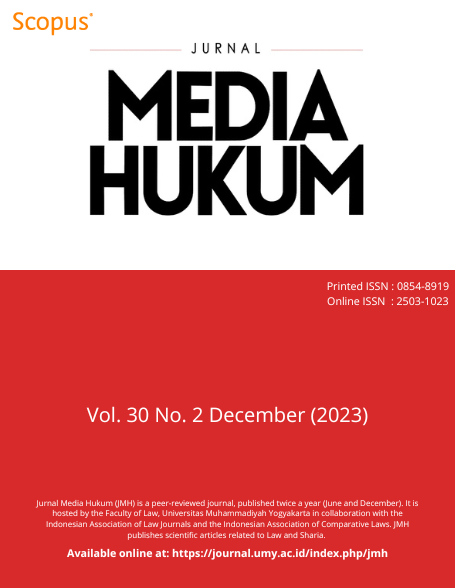The Legal Issues Concerning the Operation of Fin-Tech in Nigeria
DOI:
https://doi.org/10.18196/jmh.v30i2.18337Keywords:
Fin-Tech, Finance, Legal, Nigeria, TransactionAbstract
Technology has greatly enhanced the developmental process of the global environment. It suffices to state that, Nigeria being a developing country is also having its fair share in the use of technology within the financial sector. This is concerning the fact that the traditional method of financial activities is gradually overtaken by financial technology. However, despite the prospect of finance and technology (Fin-Tech), there are several legal issues and challenges affecting its operation in Nigeria. In this regard, this study tends to embark on a hybrid method of study on the prospect and legal issues concerning Fin-Tech in Nigeria. The questionnaire was distributed to 301 respondents residing within Nigeria. The data obtained was analysed through descriptive and analytical statistical methods. The study, therefore, found that the introduction of Fin-Tech has greatly enhanced the commercial sector in Nigeria. Although, several challenges include the legality of its operations, other social and economic challenges could affect its smooth operation. The study concluded and recommended the necessity for legal regulations, internet security, educating the general public on the Fin-Tech system, and alignment of Fin-Tech operations with Nigerian laws for a smoother adoption of Fin-Tech in Nigeria.
References
Rusydiana, Aam Slamet, ‘Developing Islamic Financial Technology in Indonesia’, Hasanuddin Economics and Business Review, 2.2 (2018) 143-152, http://dx.doi.org/10.26487/hebr.v2i2.1550
Iriobe, Grace, and Oyynlola M. Akinyede, ‘The Effect of Financial Technology Services on Banks Customers Satisfaction in Nigeria’, SSRN Electronic Journal, 2017 https://doi.org/10.2139/ssrn.2984215
Gabor, Daniela and Sally Brooks, ‘The Digital Revolution in Financial Inclusion: International Development in the Fintech Era’, New Political Economy, 22.4 (2017), 423–436. https://doi.org/10.1080/13563467.2017.1259298
Raharjo, Agus, Rahadi Wasi Bintoro and Nurani Ajeng Tri Utami,’The Legal Policy of Criminal Justice Bureaucry Cybercrime’, Bestuur, 10.2 (2022), 105-122. https://dx.doi.org/10.20961/bestuur.v10i2.64498
Aidonojie, Paul Atagamen and Esther Chetachukwu Francis, ‘Legal Issues Concerning Food Poisoning in Nigeria: The need for Judicial and Statutory Response’. Jurnal Media Hukum, 29.1 (2022), 65-78, https://doi.org/10.18196/jmh.v29i1.12595
Aidonojie, Paul Atagamen, Nosa Okuonghae and Kingsley Egogon Ukhurebor, ‘The Legal Rights and Challenges of COVID-19 Patients Accessing Private Healthcare in Nigeria’, Bestuur, 10.2 (2022), 183-197, https://doi.org/10.20961/bestuur.v10i2.68118
Masyhar, Ali and Silaas Oghenemaro Emovwodo, ’Techno-Prevention in Counterterrorism: Between Countering Crime and Human Rights Protection’, Journal of Human Rights, Culture and Legal System, 3.3 (2023). https://doi.org/10.53955/jhcls.v3i3.176
Anggriawan, Rizaldy, Andi Agus Salim, Yordan Gunawan, and Mohammad Hazyar Arumbinang, ‘Passenger Name Record Data Protection under European Union and United States Agreement: Security over Privacy?’, Hasanuddin Law Review, 8.2 (2022), 95–110. https://doi.org/10.20956/halrev.v8i2.2844
Pratama, Anugrah Muhtarom and Umi Khaerah Pati, ’Analysis Principles of Personal Data Protection on COVID-19 Digital Contact Training Application: PeduliLindungi Case Study’, Lex Scientia Law Review, 5.2 (2021), 65-88. https://doi.org/10.15294/lesrev.v5i2.50601
Pratama, Anugrah Muhtarom, Umi Khaerah Pati, Kukuh Tejomurti and Mohamad Hanapi Mohamad,’The Regulation of Disorgement in the Indonesia Capital Market: Remaining Concerns and Lessons from US’, Journal of Indonesian Legal Studies, 7.2 (2022), 585-632. https://doi.org/10.15294/jils.v7i2.58666
Metthania, Arzetta Zahra and Siti Nurul Intan Sari Dalimynthe,’Legal Protection for Parties in Sale and Purchase Transactions of Virtual Objects’, Volksgeist: Jurnal Ilmu Hukum dan Konstitusi, 5.2 (2022), 267-277. https://doi.org/10.24090/volksgeist.v5i2.7066
Ashta, Arvind and Guillaume Biot-Paquerot, ‘FinTech evolution: Strategic value management issues in a fast changing industry’, Strategic Change, 27.4 (2018), 44-59, https://doi.org/10.1002/jsc.2203
Bateman Milford, ‘South Africa’s Post-apartheid Microcredit Experiment: Moving from State-enforced to Market-enforced Exploitation’, Forum for Social Economics, 48.1 (2015), 42-58 https://doi.org/10.1080/07360932.2015.1056202
Bustami Bustami, Rio Laksamana and Zuliana Rofiqoh, ’Waqf Fundraising Through Money in the Industrial Revolution 4.0 Era: A Case Study on Baitulmaal Munzalan Indonesia’, Ijtihad: Jurnal Wacana Hukum Islam dan Kemanusiaan, 20.1 (2020), 23-40. https://doi.org/10.18326/ijtihad.v20i1.23-40
Carmen Leong, Tan Barney, Xiao Xiao, Tan Felix Ter Chian and Sun, Yuan, ‘Nurturing a FinTech ecosystem: The case of a youth microloan startup in China’, International Journal of Information Management, 4.2 (2016), 45-59 https://doi.org/10.1016/j.ijinfomgt.2016.11.006
Christopher C. Breidbach, Byron Keating and Chiehyeon Lim, ‘Fintech: Research directions to explore the digital transformation of financial service systems’, Journal of Service Theory and Practice, 30.1 (2019), 79-102. https://doi.org/10.1108/JSTP-08-2018-0185
Daniar Supriyadi,’The Regulation of Personal and Non-Personal Data in the Context of Big Data’, Journal of Human Rights, Culture and Legal System, 3.1 (2023), 33-69. https://doi.org/10.53955/jhcls.v3i1.71
Daniela Gabor, and Sally Heather Brooks, ‘The Digital Revolution in Financial Inclusion: International Development in the Fintech Era’, New Political Economy, 22.4 (2017), 423–436. https://doi.org/10.1080/13563467.2017.1259298
Davis Kevin, Rodney Maddock & Martin Foo, ‘Catching up with Indonesia’s fintech industry’, Law and Financial Markets Review, 11.1 (2017), 33-40, https://doi.org/10.1080/17521440.2017.1336398
Dupas Pascaline, Dean Karlan, Jonathan Robinson, and Diego Ubfal, ‘Banking the Unbanked? Evidence from Three Countries’, American Economic Journal: Applied Economics, 10.2 (2018), 257–297, https://doi.org/10.1257/app.20160597
Duvendack Maren, and Kate Maclean, ‘(Mis)Use of Evidence in Microfinance Programming in the Global South: A Critique’, Contemporary Social Science, 201.15 (2015), 202–211. https://doi.org/10.1080/21582041.2015.1061686
Duvendack Maren, and Philip Mader, ‘Impact of Financial Inclusion in Low- and Middle-income Countries: A Systematic Review of Reviews’, Campbell Systematic Reviews, 2 (2019), https://doi.org/10.4073/csr.2019.2.
Gde Made Swardhana and Seguito Monteiro, ‘Legal Policy of State Financial Losses Arrangement In A State-Owned Enterprise’, BESTUUR, 11.1 (2023), 171-190. https://doi.org/10.20961/bestuur.v11i1.61326
Gimpel Henner, Daniel Rau and Maximilian Röglinger, ‘Understanding FinTech start-ups – a taxonomy of consumer-oriented service offerings’, Electron Markets, 28 (2018), 245–264. https://doi.org/10.1007/s12525-017-0275-0
Gomber Peter, Jascha-Alexander Koch and Michael Siering, ‘Digital Finance and FinTech: current research and future research directions’, J Bus Econ, 87 (2017), 537–580, https://doi.org/10.1007/s11573-017-0852-x
Gunawan, Yordan, Muhamad Haris Aulawi, Rizaldy Anggriawan, and Tri Anggoro Putro, ‘Command Responsibility of Autonomous Weapons Under International Humanitarian Law’, Cogent Social Sciences, 8.1 (2022), 1–16 https://doi.org/0.1080/23311886.2022.2139906
Gunawan, Yordan and Yovi Cajapa, ’The Protection of Small and Medium Enterprises in Yogyakarta: The Challenges of ASEAN Economic Community’, Pertanika Journal of Tropical Agriculture Science, 25 (2017), 199-206. http://www.pertanika.upm.edu.my/pjtas/browse/regular-issue?article=JSSH-S0550-2017
Gunawan, Yordan and Hanna Nur Afifah, ’Indonesia E-Hailing Taxi: The Competition between Law and Technology’, Handbook of Research on Innovation and Development of E-Commerce and E-Business in ASEAN Advances in Electronic Commerce, (2020), 594-606. https://doi.org/10.4018/978-1-7998-4984-1.ch028
I Gede Agus Kurniawan, ’Digitalization of Business Law: Urgency and Orientation of the Industrial Revolution 4.0 and Society 5.0’, Volksgeist: Jurnal Ilmu Hukum and Konstitusi, 5.2 (2022), 253-265. https://doi.org/10.24090/volksgeist.v5i2.6847
Iman Nofie, ‘Assessing the dynamics of fintech in Indonesia’, Business Perspective, 15.4 (2018), 296-303, http://dx.doi.org/10.21511/imfi.15(4).2018.24
Keke Gai, Meikang Qiu and Xiaotong Sun, ‘A survey on FinTech’, Journal of Network and Computer Applications, 103 (2018), 262-273, https://doi.org/10.1016/j.jnca.2017.10.011
Kudirat Magaji W. Owolabi,’Understanding the Place of Islamic Arbitration within the Nigerian Law’, Jurnal Hukum Novelty, 14.1 (2023), 69-87. http://dx.doi.org/10.26555/novelty.v14i1.a25926
Lee In and Yong Jae Shin, ‘Fintech: Ecosystem, business models, investment decisions, and challenges’, Business Horizons, 61.1 (2018), https://doi.org/10.1016/j.bushor.2017.09.003
Leong Kelvin and Anna Sung, ‘FinTech (Financial Technology): What is It and How to Use Technologies to Create Business Value in Fintech Way?’, International Journal of Innovation, Management and Technology, 9.2 (2018), 74-78, https://doi.org/10.18178/ijimt.2018.9.2.791.
Loubere, Nicholas, ‘Indebted to Development: Microcredit as (De)Marginalisation in Rural China’, Journal of Peasant Studies, 45.3 (2018), 585–609. https://doi.org/10.1080/03066150.2016.1236025
Mention, Anne-Laure, ‘The Future of Fintech’, Research-Technology Management, 62.4 (2019), 59–63 <https://doi.org/10.1080/08956308.2019.1613123>
Milena Vučinić, ‘Fintech and Financial StabilitynPotential Influence of FinTech on Financial Stability, Risks and Benefits’, Journal of Central Banking Theory and Practice, 2 (2020), 43-66, https://doi.org/10.2478/jcbtp-2020-0013
Nadia Andika, Lastuti Abubakar and Tri Handayani,’Implementation of Principle for Responsible Investment in Distribution of Bank Credits on Infrastructur Projects’, Legality: Jurnal Ilmiah Hukum, 29.1 (2022), 130-143. https://doi.org/10.22219/ljih.v29i1.15063
Nikmah Mentari, Ninis Nugraheni and Muhammad Annas, ’Legal Protection of HARA Platform Users on the Service of Electronic Data’, Jurnal Hukum Novelty, 14.1 (2023), 51-68. http://dx.doi.org/10.26555/novelty.v14i1.a25547
Ngboawaji Daniel Nte, Urowayinor Kelita Esq, Bribena Kelvin Enokie, Onyeka Bienose, ’Cyber Crime Management among Students’, Journal of Indonesian Legal Studies, 5.2 (2020), 295-334. https://doi.org/10.15294/jils.v5i2.34005
Ngboawaji Daniel Nte, Vigo Augustine Teru, Nadiyah Meyliana Putri, ’Intelligence Education for National Security and Public Safety Policy: A Comparative Analysis of Nigeria, South Africa, and Indonesia’, Lex Scientia Law Review, 6.1 (2022), 187-218. https://doi.org/10.15294/lesrev.v6i1.54431
Odia Evans, ‘The effectiveness of monetary policy in Africa: Modeling the impact of financial inclusion. Iranian Economic Review, 20.3 (2016), 327-337, http://dx.doi.org/10.22059/ier.2016.58961.
Odutun M. Mbutor and Uba, I. Ajugo, ‘The impact of financial inclusion on monetary policy in Nigeria’, Journal of Economics and International Finance, 5.8 (2013), 318-326, https://doi.org/10.5897/jeif2013.0541
Oksana V. Vaganova and Natalya I. Bykanova, ‘Introduction of the latest digital technologies in the banking sector: foreign experience and Russian practice’, Humanities & Social Sciences Reviews, 7.5 (2019), 789-796. http://dx.doi.org/10.18510/hssr.2019.7599
Olayinka David-West, Nkemdilim Iheanachor and Ikechukwu Kelikume, ‘A resource-based view of digital financial services (DFS): An exploratory study of Nigerian providers’, Journal of Business Research, 88 (2018), 513-526, https://doi.org/10.1016/j.jbusres.2018.01.034
Olayinka David-West, Nkemdilim Iheanachor and Immanuel Umukoro, ‘Sustainable business models for the creation of mobile financial services in Nigeria’, Journal of Innovation & Knowledge, 5.2 (2020), 105-116, https://doi.org/10.1016/j.jik.2019.03.001
Peters Idede, Yaaba Bashiru, Adetoba Otoba, Tomologu-Okunomo Ade, and Tonuchi E. John, ‘How effective is monetary policy in the presence of high informality in Nigeria’, Journal of Accounting, Business and Finance Research, 10.2 (2020), 84-93, https://doi.org/10.20448/2002.102.84.93
Phan Dinh Hoang Bach , Paresh Kumar Narayan, R. Eki Rahman and Akhis R. Hutabara, ‘Do financial technology firms influence bank performance?’, Pacific-Basin Finance Journal, 62, (2020), 23-38, https://doi.org/10.1016/j.pacfin.2019.101210
Schueffel Patrick, ‘Taming the Beast: A Scientific Definition of Fintech’, J. Innov. Manag, 4.4 (2016), https://doi.org/10.24840/2183-0606_004.004_0004
Siti Nurjanah and Iffatin Nur, ’Gender Fiqh: Mobilization of Gender-Responsive Movement on Social Media’, Ijtihad: Wacana Hukum Islam dan Kemanusiaan, 22.1 (2022), 1-18. https://doi.org/10.18326/ijtihad.v22i1.1-18
Stern Caroline, Mikko Makinen and Zongxin Qian , ‘FinTechs in China – with a special focus on peer to peer lending’, Journal of Chinese Economic and Foreign Trade Studies, 10.3 (2017), 215-228. https://doi.org/10.1108/JCEFTS-06-2017-0015
Thomas Puschmann, ‘Fintech’, Bus Inf Syst Eng, 59 (2017), 69–76. https://doi.org/10.1007/s12599-017-0464-6
Tonuchi E. Joseph, Nwolisa U. Chinyere, Obikaonu C. Pauline and Alase, A. Gbenga, ‘Monetary Policy Effectiveness and Financial Inclusion in Nigeria: FinTech, ‘the Disrupter’ or ‘Enabler’, International Journal of Applied Economics, Finance and Accounting, 9.1 (2021), 19-27 https://doi.org/10.33094/8.2017.2021.91.19.27
Viswanath P. V, ‘Microcredit and Survival Microenterprises: The Role of Market Structure’, International Journal of Financial Studies, 6.1 (2018), https://doi.org/10.3390/ijfs6010001
Wardah Yuspin, et al.,’The Law Alteration on Artificial Intelligence in Reducing Islamic Bank’s Profit and Loss Sharing Risk’, Legality: Jurnal Imiah Hukum, 30.2 (2022), 267-282. https://doi.org/10.22219/ljih.v30i2.23051
Yunhe Li a, Yu Liu b, Feixue Xie, ‘Technology directors and firm innovation’, Journal of Multinational Financial Management, 50 (2019), 76-88, https://doi.org/10.1016/j.mulfin.2019.04.001










